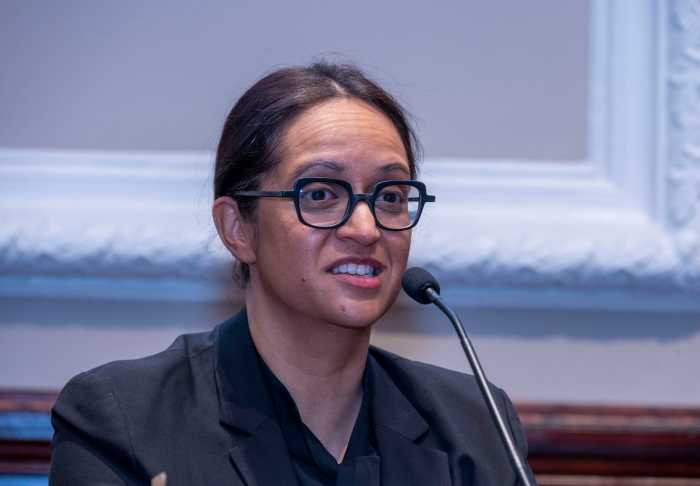Finding no “fundamental right,” judge points to legislative solution
In a lengthy written opinion incorporating a thorough review of federal and state constitutional law, New Jersey Superior Court Justice Linda R. Feinberg ruled on November 5 that New Jersey’s marriage law does not authorize same-sex couples to marry, and that the law is constitutional.
Feinberg found that there is no “fundamental right” for same-sex couples to marry in New Jersey, and that the lack of such a right does not violate equal protection of the laws.
Feinberg granted the state’s motions for summary judgment in a test case pending in Mercer County Superior Court filed last year by Lambda Legal Defense and Education Fund on behalf of seven same-sex couples.
Lambda anticipated Feinberg’s ruling––test case litigation rarely succeeds in trial courts, which are bound by prior appellate rulings. Feinberg noted that New Jersey appellate courts have consistently found the right to marry to extend only to opposite-sex couples and focused particularly on a decision that rejected a lawsuit by Rutgers University faculty members seeking domestic partnership benefits.
“We’re not surprised by this lower-court ruling,” said David Buckel, a senior Lambda staff attorney who is lead counsel in the case. “More than anything, this ruling propels us forward to higher courts where both sides have always known it will be decided.”
New Jersey’s Supreme Court is known as one of the most gay-friendly in the country, having upheld gay parenting rights in several crucial decisions, and having ordered the Boy Scouts of America to reinstate openly-gay James Dale as an assistant scoutmaster, a ruling reversed by the U.S. Supreme Court.
The marriage lawsuit was filed under the name Lewis v. Harris on June 26, 2002, and immediately attracted national attention, drawing a flurry of amicus briefs. The state quickly moved to dismiss the case, but ultimately that motion was converted into motions for summary judgment by both parties, since the questions involved were seen as solely legal, not requiring an actual trial for fact-finding.
The plaintiffs advanced three basic legal arguments: first, that the gender-neutral New Jersey marriage statute could be interpreted to allow same-sex marriages; second, that the New Jersey Constitution protects a fundamental right to marriage that includes same-sex partners; and, third, that if the marriage law does not allow same-sex partners to marry, it is unconstitutionally depriving them of equal protection of the law. All three arguments were stated in terms of New Jersey law.
At the time the case was filed, gay litigation groups were shying away from making federal constitutional claims due to the looming precedent of Bowers v. Hardwick, the 1986 case that upheld Georgia’s sodomy law. This year’s Supreme Court ruling in Lawrence v. Texas, which overruled Bowers, provides new opportunities to make federal constitutional claims, especially in light of Justice Antonin Scalia’s dissent that argued that the ruling leaves states vulnerable to demands for same-sex marriage rights.
Feinberg, however, mentioned Lawrence only briefly and did not consider it relevant to the questions before her, a view that echoed a marriage ruling by the Arizona Court of Appeals just weeks.
Feinberg easily disposed of the claim that the existing marriage statute could be interpreted to authorize same-sex marriages, concluding that the idea of same-sex marriages could not have been contemplated when the law passed in 1912. Though the statute is gender-neutral, she noted that there are numerous references elsewhere in state statute supporting the conclusion that only mixed-gender marriages are covered.
On the constitutional claims, Feinberg noted that the New Jersey Constitution’s due process and its implicit equal protection guarantees are usually interpreted to be coextensive with federal constitutional doctrine. She reviewed the lengthy history of same-sex marriage litigation, stretching back to the 1970s. Feinberg observed that even in the 1996 Hawaii marriage case, Baehr v. Lewin, in which that state’s supreme court ruled for same-sex marriage rights on equal protection grounds (overturned later by voters in a constitutional amendment), arguments for a fundamental right to same-sex marriage had been rejected.
In Vermont, where the state’s highest court found that gay people are entitled to the rights and benefits of marriage, the court was ultimately satisfied by the state’s enactment of a civil union law that specifically states that marriage is reserved for opposite-sex couples.
Both the Supreme Court and state courts have based their fundamental rights determinations heavily on history and tradition, and here Feinberg found no basis for concluding that same-sex marriage could be a fundamental right.
“The right to marry has always been understood in law and tradition to apply only to couples of different genders,” she wrote. “A change in that basic understanding would not lift a restriction on the right, but would work a fundamental transformation of marriage into an arrangement that could never have been within the intent” of the state constitution’s framers.
This argument is repeated throughout the opinion, which completely eschews discussion of moral or religious concerns about marriage, relying instead solidly on history and tradition.
On the equal protection issue, Feinberg noted that New Jersey analyzes equal protection by using a “balancing test,” weighing the importance of the right asserted and the justification advanced by the government for its differential treatment of a particular situation. Having found that there is no fundamental right to same-sex marriage, Feinberg found the balance weighed in favor of the government, embracing, though not explicitly citing, Supreme Court Justice Sandra Day O’Connor’s comment in her Lawrence concurrence that a state might have a legitimate interest in preserving traditional marriage.
Feinberg emphasized that changes in policy should normally be made by the legislature, not the courts, and noted that in fact the gay rights movement has achieved significant legislative gains in New Jersey on nondiscrimination, domestic violence, and parenting issues.
“It is entirely reasonable for the Legislature to enact legislative changes to protect same-sex couples without disturbing the marriage statute,” she wrote. “Impatience with the scope or pace of change is an insufficient basis upon which to justify the judicial creation of a new constitutional right.”
Noting that no other state grant same-sex couples marriage rights, Feinberg wrote, “It is reasonable for the Legislature to conclude that this State has an interest in preserving uniformity among the States with respect to the definition of marriage.”
Feinberg concluded by observing that the legislature might decide to be a “trailblazer” on this issue, but that it was up to the legislature to make that determination, not the courts.


































